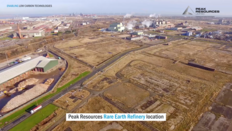- The Wilton refinery will process rare earth minerals for products like mobile phones and wind turbines.
- Production is expected to start in 2019.
- The site was chosen for its logistics, resources, and skilled labor.
- The refinery will focus on neodymium and praseodymium from Tanzania.

Investment and Location
Peak Resources has confirmed a £70 million investment to establish a rare earth refinery at the Wilton International Site. This facility will process minerals for use in various products, including mobile phones, wind turbines, and the automotive sector. If approved, production is expected to commence in 2019.
Site Selection
After a global search across more than 25 countries, Wilton was chosen for its access to global shipping, affordable and reliable bulk reagent supplies, a skilled labor force, and readily available power and water. This will be the second mineral processing facility at Wilton, with Sirius UK also planning operations there.
Economic Considerations
Peak Resources' MD, Darren Townsend, highlighted the advantages of the Tees Valley location, including the devaluation of the pound, which is expected to reduce operating costs, and the UK's commitment to maintaining competitive corporate fiscal regimes post-Brexit.
Local Support
Councillor Sue Jeffrey, leader of Redcar and Cleveland Council, emphasized the collaborative efforts of the Combined Authority with Peak Resources to support the project. The selection of Tees Valley by an international company underscores the region's strong reputation in manufacturing.
Focus on Rare Earth Elements
The refinery will concentrate on processing neodymium and praseodymium, soft metals sourced from the Ngualla mine in Tanzania. These elements are crucial for the permanent magnet market, which is expected to grow due to increasing demand for electric vehicles and wind power generation.
Site Advantages
Stephen Hands, site director of Sembcorp Utilities UK, noted the benefits of Wilton International, including competitively priced energy, excellent infrastructure, logistics, and proximity to the River Tees. These factors, along with a skilled workforce, position minerals processing as a potential growth sector for the site.

